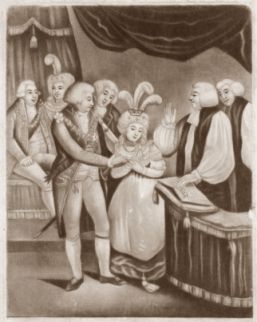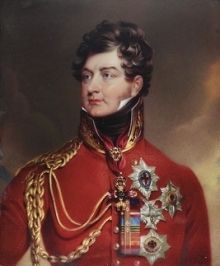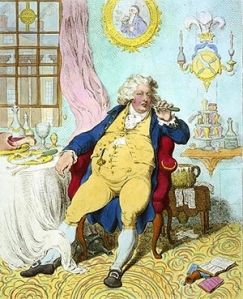nn
n
n The marriage was falling apart even before the inknwas dry in the parish register. George was back in the arms of his mistress notnlong after his hangover had worn off and Caroline awoke to a living nightmare,nshackled to a fat, drunken roué, friendless in a foreign land, herndreams of a pampered life in the splendour of the English court ripped tonribbons.
n
n
nWhen King George III, (George’s father and Caroline’s uncle),ndiscovered what was going on in Carlton House, he had a discreet word with thenpair of them. He realised that things were never going to be perfect, butncouldn’t they just make a show of things, appear in public when the occasionnnecessitated, wave to the crowds and perhaps pretend that the marriage wasn’t ansham. Caroline saw the sense in this. She had her own dignity, and the futurenof her daughter’s succession, to consider, but only if George reconsidered hisnwayward ways and his atrocious behaviour towards her. George, being George,ndecided that an immediate separation was the only answer, both of them goingntheir own way, and having no communication whatsoever again. Letters werenexchanged, accusations were laid, fingers were pointed and terms were agreed.
n
n
n
n
nIn one thing, at least, Caroline won a small victory; she wrote directly to thenKing, telling him in no uncertain terms, that the Countess of Jersey (George’snmistress) was at the heart of the marital breakdown. The King agreed with her,nand delivered the Countess an easy choice – resign or be dismissed from thenroyal household. It was no choice at all, she resigned her position, in anspiteful letter, and flounced away – (in a diary entry of early 1796, thenHonourable Mrs Calvert wrote that, when passing through Covent Garden, thencrowd mistook her to be the Countess and pelted her carriage and her servantsnwith mud). So, the London mob agreed with Caroline as to where the true blamenlaid, and their sympathies went out to the Princess, who was seen to be theninjured party in the whole sorry affair.
n
n
n
n
nWith Jersey out of the way, Carolineneven wrote to the Prince, suggesting a reconciliation, but George, who hadntired of this particular mistress in any case and was glad to be rid of her,nreturned to Maria Fitzherbert, whom he still regarded as his ‘true’nwife. In January 1796, George had been taken ill and he feared for his life,ngoing so far as to write a will, in which he left all his worldly goods to
n
n
n
n“MarianFitzherbert, my Wife, the Wife of my heart and soul,”n
n
n
n(apart from a bequestnof one pound sterling to Caroline), and in all likelihood, this focussed hisnmind onto where his real affections lay. So, when he unexpectedly recovered, henbegan to bombard Mrs Fitzherbert with letters, begging to be reconciled withnher.
n
n
n
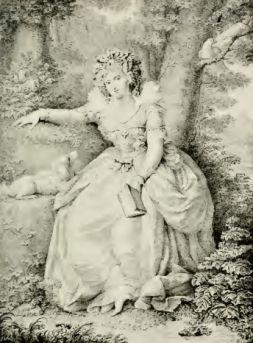 |
| Mrs Fitzherbert |
n
n
n
nInitially, she ignored him, but he persisted and eventually she replied,nthat she would consider renewing their relationship, but only if the Pope wouldnpronounce their initial marriage to have been legal under Church law. Now, ifnword of this appeal to Rome had got out at the time, I cannot see how therenwould not have been anti-Catholic riots in the streets throughout the land,nquite possibly with a few fanatical burnings thrown in for good measure, and anreturn to the happy times enjoyed by all during the reigns of the Tudors.nFortunately, it was all kept profoundly secret, but when His Holiness’snapproval was received, from New Year 1800, the Prince and Mrs Fitzherbert werenseen walking out together in public. Not that it was ever going to last, (thenPrince’s libido didn’t work that way), and Mrs Fitzherbert would be replaced bynthe Marchioness of Hertford. And she would be replaced by Lady Conyngham. Andnshe would be replaced by … well, you get the picture, I’m sure.
n
n
n
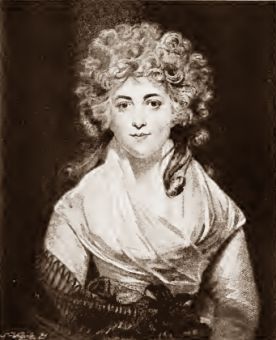 |
| Isabella, Marchioness of Hertford |
n
n
n
nAs fornCaroline, she moved out of Carlton House and into Shrewsbury House, in thenvillage of Charlton, close to Blackheath, taking Princess Charlotte with her.nFor the years they lived at Blackheath, it was a world away from the stiflingnlife at court. Caroline received as her guests some of the most brilliant mennand women of the day, and they responded to the relaxed atmosphere, free fromnthe formalities and rigid etiquette usually found in royal circles. The Kingnhimself was a frequent visitor, and he doted on his granddaughter, who was anbright, talented child, captivating all who met her. Other than an occasionalntrip to the theatre or the opera, the Princess of Wales rarely appeared innpublic, restricting her life to Blackheath, with the odd seaside holiday innRamsgate or Margate.
n
n
n
n
n
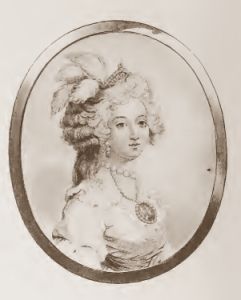 |
| Caroline |
n
n
n
nShe wrote for pleasure, read both the classics and thennewest novels, took an interest in gardening and pressed flowers, learned tonplay the harp, undertook the effort to improve her English (with a tutor named,nunEnglishly, Giffadière), painted and learned clay modelling, although hernprincipal occupation was the education of her daughter. She also took a numbernof local children under her wing, providing education or positions for them,nand was well known for her philanthropy by the local villagers. When it becamentime for Princess Charlotte to go away to school, Caroline adopted a local baby,none William Austin, as, it has been suggested, she did not wish to live in anhouse without children present. She also made the acquaintance of some newnneighbours to Blackheath, Sir John and Lady Douglas, and they very quicklynbecame firm friends, with Caroline standing as godmother to the Douglas’snsecond child.
n
n
n
nAnd no one saw what was coming next.
nnn
n
nnn
nTomorrow – accusations and scandals.
nnn
n
nnn

